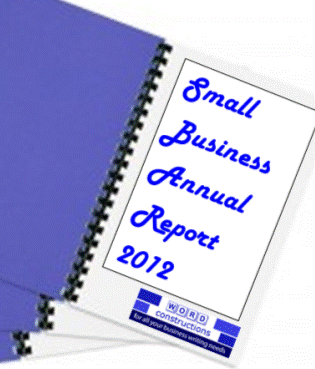I hope you find my writing and business tips and observations useful. My business and blog are dedicated to helping businesses communicate clearly and reach their potential.
Read, subscribe to my newsletter, enjoy!Tash
Are annual reports just for big business?
What do you think of when you hear about an annual report?
If you’re like most people, you think of thick, boring document produced by big business each year, sent out to shareholders who never read them. And there is a certain amount of truth to that, too.
Annual report rules
If you’re new to business, you may suddenly wonder about annual reports – and if there are any rules meaning you have to produce one, too.
The good news for SMBs is that annual reports are not mandatory for every business. However, once you register as a company you may have to produce annual financial reports (which is usually presented as an annual report).
You may also need to produce some sort of annual report if it is stated in your constitution, deed, financial agreement or other controlling document.
Generally speaking, the rules apply to the financial information you must include; the remaining information is an account of the business for the prior 12 months and is often determined by the company itself or the associated industry standards.
Creating an annual report
So if you don’t have to prepare an annual report, can you?
Yes, any business can prepare an annual report – and add whatever you like to it if you are doing it voluntarily!
A good annual report is a mix of general information, financial information and marketing. It is used by people to decide if they want to invest with the business – whether that means a direct investment as a shareholder or as a client – or even be associated with the business (such as an employee adviser or supplier).
Having an annual report certainly adds an air of professionalism and credibility to any business, and you can limit the financial information if you wanted.
On the other hand, it can be time-consuming and expensive to produce an annual report so it’s not something to be taken lightly.
For a business that doesn’t have to produce an annual report, do you think there is much value in doing so? Would you consider creating one for your business?
An annual report by any other name…
I sometimes refer to writing annual reports for clients, but you may know those reports by another name such as:
- trustee report
- annual trustee report
- shareholders’ report
- report for members
- membership report
- AGM reports (although these are often simpler and delivered orally)
- company report
- annual credit report
Are there any other name you use or know for annual reports from a company or similar entity?
A company is singular
Most people understand that the verb needs to match the number of subjects – that is, if the subject is singular, the verb is the single tense, but if the subject is plural, the verb must be the plural version.
For example:
the boys go to the park daily OR the boy goes to the park daily
they sing very well OR she sings very well
my friends eat quickly OR my friend eats quickly
Where people sometimes get confused is with words that appear plural when they aren’t, or singular when they are plural. For example, children, women and men are plural even though they don’t end in s, and words such as crowd, group, herd and pack are singular even though they have multiple parts.
When writing about a business, it is also a singular word even if it sounds plural (for example Woolworths and Brambles are both singular so ‘Brambles is in Australia’s top 100 companies’ is correct.)
Remember that the business name could be replaced with the word ‘it’ so match the verb with ‘it’. A business or a company is a thing (the people behind it are its staff or owners) so does not use the pronoun ‘they’, although is a common misuse in conversations.


Recent Comments